
The author of this site as well as his collaborators can not stay in the side from that unprecendented tragedy, which not only has concerned the whole folk in USA, as well as has forced to shudder the whole world. We express sincere condolence to all, who damaged in this tragedy, together with the american people we are grieving on lost, amongst which can be our colleagues - astronomers - amateurs and professionals, not having no relations to that political claims, which followed initiators this inhuman share. But we are sure certainly that our friendship, our cooperation in the science will support us mutually in any hard situations, from which, regrettably, nobody until guaranteed.
Welcome to the Planetary Homepage ! This is only the first experience to give you some information about the studies of the planets and other solar system bodies in the Laboratory of Lunar and Planetary Physics, which is active in Fessenkov Astrophysical Institute of Kazakhstan Academy of Sciences. We hope that the images of celestial bodies and some other scientific results will be more or less useful for professionals and amateurs who are interested in the study of our solar system. Most of pictures may be viewed at higher resolution if you click the blue inscription on the right of the picture. We shall update periodically our site and we would be grateful for any responce on its content.
Fessenkov Astrophysical Institute
Gavriil A.TIKHOV - 125 Anniversary from the birth
Laboratory of Lunar and Planetary Physics
- Zonal spectrophotometry of Jupiter
Mars .
- Mars 1999 - Observations from Alma-Ata.
Planetary satellites, comets and Asteroids
- Observations of the Noctilucent clouds
The beginning of planetary researches (as well as all astronomical science) in Kazakhstan was connected with the names of two known Russian astrophysicists academicians Gavriil Tikhov and Vasilij Fessenkov. Both came to Alma-Ata in 1941 for the observations of the total solar eclipse and stay here on many years.At Kazakhstan Academy of Sciences G.A.Tikhov organized the Astrobotany laboratory and V.G.Fessenkov founded Astrophysical institute with the Mountain observatory near Alma-Ata. In 2000 May 1 we shall remember Tikhov in connection with 125 anniversary of his birth.
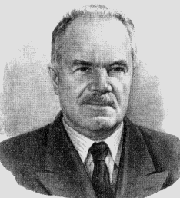
Fessenkov V.G.(1889-1972)
Tikhov G.A.(1875-1960)
You may not remember where Kazakhstan Republic and the observatories of Fessenkov Astrophysical institute are placed but you may see it on the maps here. Three observatories marked on the second map are following: AFIF - the Institute staff, observatory and laboratories on Kamenskoe Plateau, TSHAO - Tyan-Shan observatory near Alma-Ata mountain peak, and ASSY - the Assy observatory on Assy-Turgen plateau.
Kazakhstan Republic on the Eurasia continent - the general map.
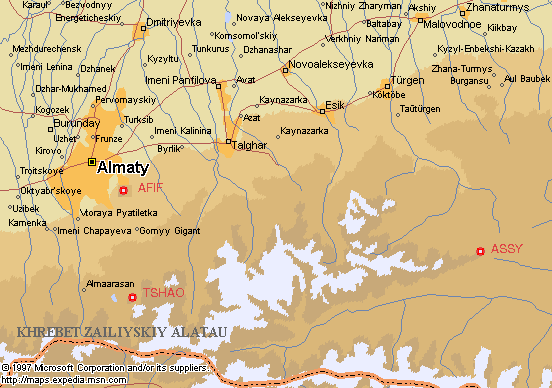
The observatories in the mountain neighbourhoods of Alma-Ata city.
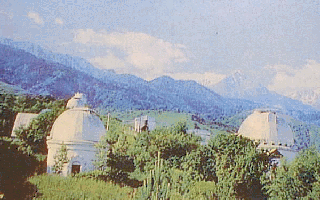
View of the observatory on Kamenskoe Plateau
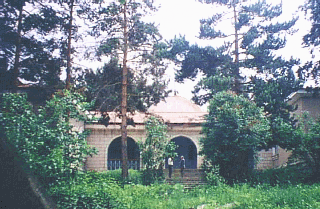
Main building of Fessenkov Astrophysical Institute
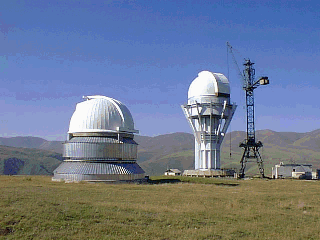
Assy observatory: 1-m telescope dome (left) and 1.5-m telescope tower.
The construction of a dome and mounting for a new 1.5-m telescope at the Assy Observatory began during the last decade, but financial difficulties connected with the dissolution of the Soviet Union have not allowed the work to be completed. The atmospheric conditions at Assy Observatory are very favorable for planetary observations: high transparency, an absence of light pollution, and normally very little turbulence. The Jovian satellite Ganymede was once seen distinctly as a crescent moon (only about one arc second apparent angular diameter) during its entry into Jupiter's shadow. An exceptional set of photographic images of Mars with very high quality and resolution were obtained with the 1-m telescope in September 1988.
The Laboratory of Lunar and Planetary Physics was organized officially as a division of Astrophysical Institute of Kazakhstan Academy of Sciences in 1970, although the planetary team was formed a decade earlier and accumulated good experience in observations of the planets. The older equipment was modified and from the 1970s to the 1990s many observations were carried out with different photoelectric devices, including electronic image-tubes and photomultipliers.
In the former Soviet Union, the Astrophysical Institute was nominated as the coordinating organization for observational planetary research. Many conferences connected with the study of these planets were held in Alma-Ata, involving planetary astronomers from Russia, Ukraine, Georgia and Azerbaidjan. Some planetary observations and their analyses were cooperative, such as a study of the colorimetry of the Moon, a polarimetric study of Jupiter, and observations of the minor planets. These contacts are more difficult now because of the financial problems for science in all the countries of the former Soviet Union.
The Laboratory of Lunar and Planetary Physics has participated in many other international programs directed toward the ground-based astrophysical support of space missions. It is planned to continue these studies in the future through friendly collaborations with colleagues from other countries. Most of the results of this work have been published in the journal of the Russian Academy of Sciences, Astronomicheskij Vestnik, which is translated into English as Solar System Research, as well as in other international journals. The Institute welcomes contacts from colleagues interested in jointly analyzing existing data obtained in Kazakstan, or in collaborating on future planetary observational projects. We are very grateful to our foreign colleagues for their friendly help and collaboration. Thanks their help we have some new devices (as CCD-camera from European Southern Observatory), regular subscription on main planetary journal ICARUS (from American Astronomical Society) , different books from our friends in other countries. We indebted also to our provider in Internet - the Kazakhstan-American company NURSAT for great help in this hard time for our science.

Thank you for your attention!
tejf@hotmail.com
Fessenkov Astrophysical Institute
Kazakhstan National Academy of Sciences
Alma-Ata 480020
Kazakhstan
Last update 1 May 2000